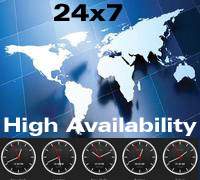Asynchronous and Synchronous Disk I/O Differences
Basic Concept of Disc Operating System for I/O mechanism:
Computer operations are delayed due to a slower peripheral speed. Peripheral speed is the speed of hard drive, cd-rom and other such devices through which the computer tends to read and write. The speed of the processor is very high when compared to these peripherals. Thus eventually when you get a result which requires a read and write operation, there is a bit delay in it. The computing speed of the computer depends entirely on the processor. Thus an operation which includes only calculation is quite faster than the operations requiring read and write from peripheral devices.
Asynchronous disk I/O is also called non-blocking I/O. It's a form of I/O which lets another process to begin before the transmission of the first I/O has finished. It's a much complicated process. In this methodology of I/O a process which requires a read-write is executed first. After the read-write is finished (however the process is still not completed, but only the read/write is done for the process) the process is rendered to be finished and a flag is raised marking it to be finished. Now, the computational part of it is handled by the processor. But after raising the flag from process 1, the cache is ready for yet another process. It is now ready for another process. So now even when the process 1 might be in its computational phase, the peripheral is handling another process.
This is a much faster methodology, but is quite complicated. In Asynchronous disk I/O the process which does not require the disk I/O can continue and will be handled before the process waiting for the disk I/O. Thus the process which does not require the disk I/O is not blocked due to the process which requires a disk I/O, and hence is called the non blocking disk I/O. The process which does not require the I/O does not have any dependency on the process which require the disk I/O and thus it is a much faster and more resource full. It makes use of the processor in the best possible way and thus many operating systems are using this methodology to perform faster computations at any level.
The above blocking and non-blocking disk I/O also plays an important role in the databases. While configuring the back up for a database, it is very important that the type of disk I/O is mentioned. In synchronous I/O the server process will perform only one task at a time and this task will be either of reading or either writing. The RMAN will be either allowed to read or to write. But however in asynchronous disk I/O even when the RMAN is reading or writing data, the server process can perform other work. In asynchronous disk I/O RMAN is allowed to perform multiple read/write operations irrespective of the competition of the first read/write task.
During DBA Services, experts database dba always takes care of disk io for precaution of Oracle tuning and Oracle performance tuning of disk io tuning. It is best practice in database administration.
Hiring senior Oracle DBA process is time consuming and costly. After hiring senior remote dba experts, there is no guarantee of stability of him or her. Due to this reason, nowadays company prefers remote DBA services. Company would get professional expert remote DBA support in lowest cost and without risk of stability. Dbametrix is worldwide leader remote DBA experts team and offering uninterrupted stable professional remote dba support to worldwide clients. You can trust on our remote dba work. Contact our sales department for more query without technical specification and requirement SLA.









